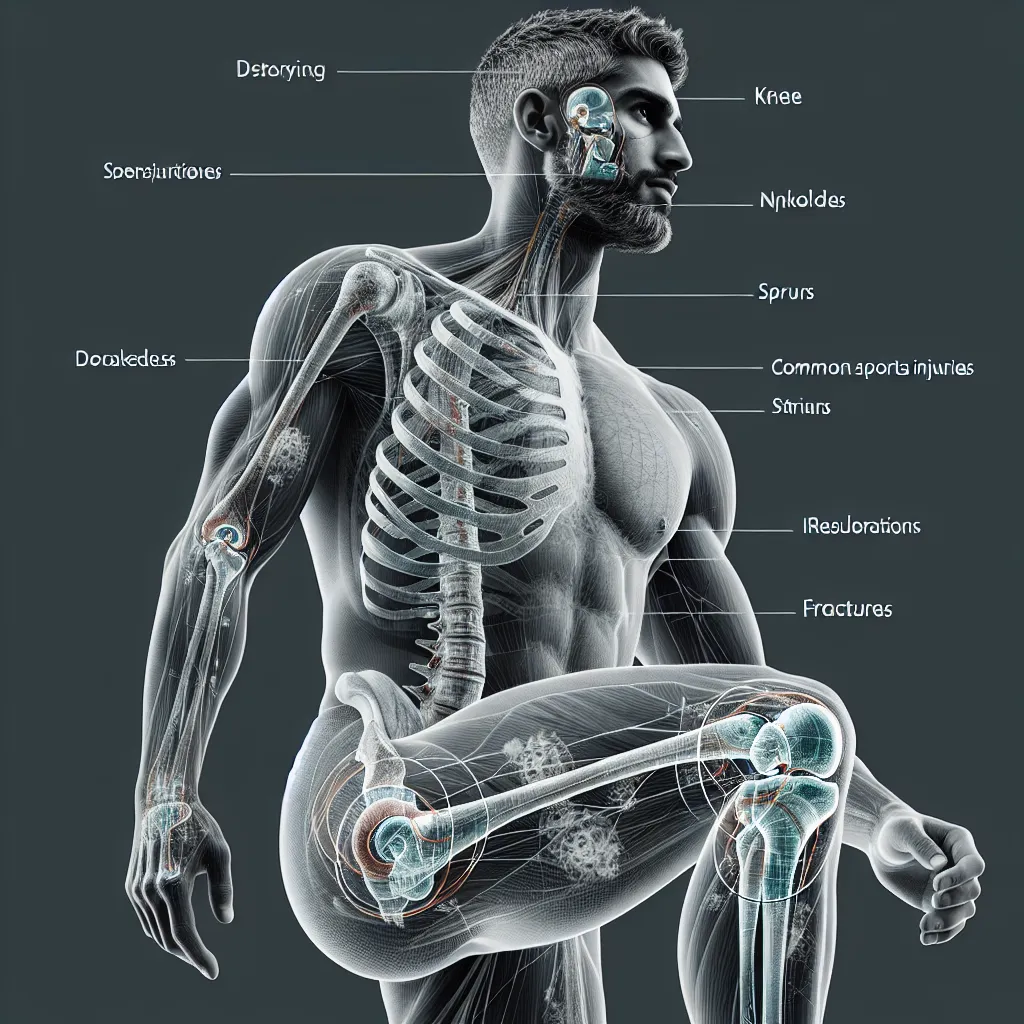‘Sports injury’ is a crucial term in the realm of athletics and physical education. Let’s break it down:
Definition: A sports injury refers to any form of damage or harm sustained during physical activity or sports participation.
Part of speech: Noun phrase
Pronunciation: /spɔːts ˈɪndʒəri/
In the context of sports medicine and athletic performance, understanding the terminology related to sports injuries is essential. This knowledge is particularly valuable for IELTS test-takers, as health and fitness topics frequently appear in various sections of the exam.

Usage Context of ‘Sports Injury’
Examples and Analysis
-
The professional footballer was sidelined for three months due to a severe sports injury.
Analysis: This sentence demonstrates the impact of sports injuries on an athlete’s career. The term ‘sidelined’ is often used in conjunction with ‘sports injury’ to indicate a period of inactivity. -
The sports medicine clinic specializes in treating a wide range of sports injuries, from minor sprains to complex fractures.
Analysis: Here, ‘sports injuries’ is used in a broader context, highlighting the variety of conditions that fall under this category. -
Proper warm-up exercises can significantly reduce the risk of sports injuries during intense training sessions.
Analysis: This example emphasizes the preventive aspect of sports injury management, linking it to proper training techniques. -
The physiotherapist developed a comprehensive rehabilitation plan to help the athlete recover from their sports injury.
Analysis: This sentence showcases the role of healthcare professionals in treating sports injuries, introducing related vocabulary like ‘rehabilitation’. -
Many sports injuries can be attributed to overuse or improper technique rather than sudden accidents.
Analysis: This example provides insight into the causes of sports injuries, broadening the understanding of the term beyond acute incidents.
Common Contexts
‘Sports injury’ is frequently encountered in:
- Sports news and reports
- Medical and physiotherapy discussions
- Fitness and training advice
- Health and wellness articles
- Sports psychology literature
Frequency in IELTS
The term ‘sports injury’ and related vocabulary are moderately common in IELTS exams. They may appear in:
- Reading passages about health, sports, or medicine
- Listening sections featuring conversations about athletic training or medical consultations
- Writing Task 2 essays on topics related to sports, health, or fitness
- Speaking Part 3 discussions about sports, health risks, or medical advancements
Vocabulary Analysis
Word Structure
‘Sports injury’ is a compound noun consisting of:
- ‘Sports’: Refers to physical activities governed by a set of rules
- ‘Injury’: Denotes harm or damage to the body
Synonyms and Antonyms
Synonyms (with analysis):
-
Athletic injury (/æθˈletɪk ˈɪndʒəri/ – noun phrase)
This term is often used interchangeably with ‘sports injury’ but may have a broader application, including injuries sustained during general athletic activities. -
Training-related trauma (/ˈtreɪnɪŋ rɪˈleɪtɪd ˈtrɔːmə/ – noun phrase)
This phrase emphasizes injuries specifically resulting from training regimens, highlighting the cause more explicitly. -
Exercise-induced damage (/ˈeksəsaɪz ɪnˈdjuːst ˈdæmɪdʒ/ – noun phrase)
This term broadens the context to include injuries from any form of physical exercise, not just organized sports.
Antonyms (with analysis):
-
Physical fitness (/ˈfɪzɪkəl ˈfɪtnəs/ – noun phrase)
Representing the opposite state of being injured, this term denotes good health and physical condition. -
Peak performance (/piːk pəˈfɔːməns/ – noun phrase)
This phrase describes the optimal state of an athlete, contrasting with the limitations imposed by sports injuries.
Memorization Techniques
Mind Mapping
Create a mind map with ‘Sports Injury’ at the center, branching out to related concepts:
- Types (e.g., sprains, strains, fractures)
- Causes (e.g., overuse, poor technique, accidents)
- Treatment methods (e.g., RICE, physiotherapy, surgery)
- Prevention strategies (e.g., warm-up, proper equipment, training)
- Affected body parts (e.g., knee, ankle, shoulder)
Storytelling Technique
Imagine a narrative: “Sam, the star striker, was racing towards the goal when suddenly he felt a sharp pain in his hamstring. This sports injury benched him for weeks, teaching him the importance of proper warm-up and stretching.”
Practice Exercises
Application in IELTS
-
Writing Task 2 Sample Question:
“Some people believe that professional sports contribute to an unhealthy focus on physical performance, leading to long-term health issues. To what extent do you agree or disagree?”In your response, incorporate ‘sports injury’ and related vocabulary to support your arguments.
-
Speaking Part 3 Practice:
Question: “What measures can be taken to reduce the risk of sports injuries in schools?”Develop a response using specific terminology related to sports injuries and prevention strategies.
Repetition and Review
- Create flashcards with ‘sports injury’ and related terms on one side and definitions or example sentences on the other.
- Set reminders to review these terms at increasing intervals (e.g., after 1 day, 3 days, 1 week, 2 weeks) to reinforce long-term memory.
Conclusion
Mastering the vocabulary surrounding ‘sports injury’ is crucial for success in the IELTS exam, particularly when discussing health, fitness, and sports-related topics. By understanding the context, analyzing related terms, and practicing their usage, you’ll be well-prepared to tackle various sections of the test with confidence.
Remember to apply these new terms in your own sentences and discussions. Practice using ‘sports injury’ and its related vocabulary in conversations or writing exercises to solidify your understanding. If you have any questions about using this term or need clarification on any points, feel free to ask in the comments section below.
For more information on related topics, you might find these articles helpful: